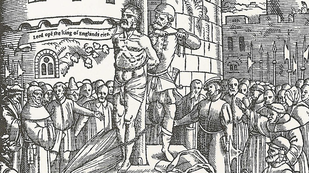 Luke 21:13: “This will be your opportunity to bear witness.” Luke 21:10-38 is my text for the Saturday sidewalk and Sunday sermons. Usually—at least when I have been in the pew listening—this text is a “let’s get the timing of the second coming right” (i.e., when is Jesus coming back and let’s prepare for it) text. Luke isn’t asking (or telling) the timing on the second coming, but that soon all hell is going to break loose and you need to stay faithful to Me through it all. Luke 21:13 stands out—and it’s not usually a verse covered too much when Luke 21 is viewed as a “timing of the second coming” passage. Here it is: “This will be your opportunity to bear witness.” More straight forward, this verse, after all the disaster that is described to take place, this verse is actually, like a pause . . . like this: “There will be wars and natural disasters and before all this you will be jailed, persecuted, and brought before authorities on account of Me . . . an opportunity for martyrdom.” This takes all the power from us. Something even as Christians we shun and do whatever we can to retain our power. Still . . . Yep, that’s the word here: μαρτύριον, martyrdom. Makes sense this word can be martyrdom or testimony, witness (which is how the ESV and most Bible translations render it). But we can’t loose sight over the fact this word conveys being a martyr. When all hell breaks loose and you are persecuted and jailed and killed for being my followers, all this will present an opportunity for you to be a martyr, an opportunity for a witness. When Jesus goes on afterward, saying don’t plan on what you’re going to say at your defense, I will give you the words (v. 14-15). Many use this to take back the power, to retain our power. Many take this as God will supernaturally give you words to say. We all like to be able to claim that—makes us out to be powerful, special to God, a force to be reckoned with; heck, God is speaking through me! Yea. No. It points in another direction: “Don’t try to defend yourself when brought before the court because you’re a follower of Me. Testify—witness, be a martyr—of Me. This will be your opportunity to be my witness, my martyr.” This speaks. We are too prone to defend ourselves. To claim power. Rather we are called to testify (to loose all power) of Jesus, even when all hell breaks loose. Perhaps we can fathom this type of bearing witness in places like Afghanistan, Syria, China, Iran, Venezuela. Maybe, someday we’ll be in a place like that. But what about now? We can’t even take the tough times here and now and see the opportunity to be a witness, let alone when all hell breaks loose. This is an opportunity for you to be a witness, a testimony, a martyr.
0 Comments
 As people are gathering in Asbury and now other campuses, whether this is truly a revival or not, people are still praying and confessing confessing sin and committing themselves more deeply to God. Many people appeal to the “Spirit” texts in Acts as both rationale (proof) that what is happening in Kentucky and other campuses is a “revival” and, also, among the sincere prayers that truly want God to do it again (like in Acts). I'd like to give you, however, some prayers based on the contexts of thees “Spirit” texts in Acts, which have the marks of these Acts chapters (2, 4, 8, 10, 13, and 19), that are faithful to the text, and underscore the theological intent Luke wanted to pass on to the church long afterward . . . so, let us pray . . . Acts 2: The promised Spirit falls and gives birth to the church in the presence of witnesses from all the known nations, i.e., all the corners of the earth. Yes. Do this again: may the church rediscover the falling of the Spirit so that it in its local expressions it will bear witness to the nations. And, may the Spirit renew the church’s desire for apostolic teaching, fellowship, and concern for the poor—and for what it means to be gathered together as church. Acts 4: May the Spirit fall to shake us, the church, that we might learn to bear witness and boldly proclaim the gospel despite the nations raging. And may we, again, develop a concern for the poor, and as well hold all things in common as a witness to those that rage against us. Acts 8: May the Spirit fall on us in such away that we accept the Samaritans among us, those who are different, unclean, born of the “wrong” ethnicity, may the Spirit throw us out of our temples and into new hinterlands to proclaim and live out the gospel. Acts 10: May the Spirit fall on those whom we hate, our enemies, those who are among the “raging Gentiles,” so that we, the church, may rediscover the gospel is also for the “raging Gentiles.” Acts 13: Although very rarely it is included in the revival proof chapter lists, it should be: May the Spirit might fall on us so that missionaries would be called and set apart and sent to the unreached around the globe and to those who are among us even now, the unclean, dirty rotten Gentiles so that they may hear and have opportunities to respond to the good news of Jesus Christ; may the Spirit drive us out toward the hinterlands and the ends of the earth. Acts 19: Though not a falling of the Spirit part of the narrative, still may the Spirit move us toward unknown and unreached places and fill us in such a way to confront idolatry (even our own idolatries and the idolatries we kind of like having around so our identities as church can be maintained in this land). Hear our prayers. Amen!  At the end of my summer Bible college internship at my church, I had the privilege of giving a sermon at our evening Sunday service. Back then, most folks showed up, so it was a nice sized crowd who’d come to hear this rookie preacher-in-training. My text was 2 Chronicles 7:1-3, when the fire came down and filled the temple after King Solomon’s prayer. “As soon as Solomon finished his prayer, fire came down from heaven and consumed the burnt offering and the sacrifices, and the glory of the LORD filled the temple. And the priests could not enter the house of the LORD, because the glory of the LORD filled the LORD'S house. When all the people of Israel saw the fire come down and the glory of the LORD on the temple, they bowed down with their faces to the ground on the pavement and worshiped and gave thanks to the LORD, saying, ‘For he is good, for his steadfast love endures forever.’” Now I certainly would preach this a little different now. Then I took a look at all the places God filled his temple. I think I did alright. But what happened at the end surprised me and I’ll remember it until heaven. I had asked for no closing hymn after sermon and my closing prayer, just a thank you and good night . . . I remember Olive simply played a song as I moved from the pulpit to the steps down from the platform . . . when I had gotten down the steps, I saw a long line of people streaming up front to the altar. More than half the congregation (about 100 folks) was down on their knees at or near the altar, with the rest simply not moving from where they sat. No one left the sanctuary. I had gathered with the elders in the back and we all were kind of stunned. My preaching was good, but not that good! Now if only all my church work and special guest preaching times throughout my years had similar effect. Hasn’t happened since. I have been in a number of church service settings with similar reactions to the sermon and/or simply the whole service. There were a few times at chapel or a “deeper life” with varying lengths of duration when I was a professor at Prairie Bible College in Three Hills, Alberta. I do believe in moments like these, when it seems God is doing something far beyond the normal come and go of a church (or a chapel) service. I have read and studied the big, historical movements and moments in our American church history. From Jonathan Edwards to Charlies Finney to Timothy Dwight, as well as such moments on Christian college and seminary campuses. So, I know that God is able to do beyond the normal at or after a service—sometimes we can explain why, most of the time it just happens and we can’t explain it. It just happens with varying after effects. So, I do not want to play down or diminish what God could be doing at Asbury right now; but, I do want to give some perspective that I am not hearing from our various Christians folks in-the-know about “revivals.”
These are what I am thinking right now.
I do hope new commitments are being made by these students and faculty. I do pray new missionary movements will be born. I do pray they will never ever be the same. And, I do hope many unsaved will be saved as a result. Yet in the age of the internet, I am also concerned that we’re making more of this “Asbury revival” than ought to be made of it, that somehow God is not at work where we are at, moving in mysterious ways, unnoticed by social media . . . yet He is still working.  It’s not what you think. I am not speaking about church folk being addicted to porn or anything like that. In fact, I am not writing here about sexually explicit porn. Nonetheless, to be frank, I am concerned about something less obvious, as harmful, maybe even more dangerous. Especially to the church. We seem to know the common definitions of the words “porn” or “pornography” as images of sensuousness, sexuality, and sex. Interestingly, there is a definition that puts porn/pornography on a whole deferent level beyond the easy to identify “sexual porn.” Merriam-Webster also defines “porn” as the “depiction of acts in a sensational manner so as to arouse a quick intense emotional reaction.” Most immediately pivot to the sexual implications. However, while that can—as it should—definitely be understood to be the sexual nature most associated with porn/pornography, this definition makes it possible that more than sex can be in the arena of porn. In fact anything “emphasizing the sensuous or sensational aspects of even a nonsexual subject and stimulating a compulsive interest from their audience” is, well, porn. Here I’d like to focus our attention on what I will call “church porn.” I am borrowing from the so-called image-based sexual revolution that has been afoot since 1916, when ladies began displaying knee-high bathing suits above the ankles and men showed off their muscle-building on the beach to display their fit bodies for public consumption. (And you thought it was a sixties thing.) It’s taken decades, but the sexual revolution has created everyday habits and associations that form the way you and I think, literally about everything. As teenage boys (and sadly, girls, as well), by the time they are young adults, are exposed to thousands of hours of sexual imagery (explicit and soft and suggestive), mostly depicting that women are there to meet their needs and pleasure, the same is also true of those entering ministry. Here I am not just focused on sexual porn, but the porn of success, images of desire and expectations that have formed a whole narrative about the world and how it works. This has created sensational and, yes, sensuous feelings, expectations, and imaginations in those training for ministry, who will be praying and seeking for “a call,” and, as well, those simply picking a church and looking to meet his/her (or family) needs—informed and shaped needs created by those thousands of hours of exposure. As individuals seek “God’s will,” they have been, already, exposed to hours of imagery of what will meet one’s needs, bring success, and be affirmed by one’s felt peer group. These thousands of images have shaped the imagination of what that “call” or church should look like. This is the porn that is molding the expectations of both their choice of a church and “the call” one feels when looking for a pastoral call, a potential place of ministry (lay or pastoral), or simply “being led” to a choice of church to attend. This is a problem. A problem for the church. A problem for churches that don’t stimulate that compulsive interest that has been embedded into us, culturally, socially, or personally. This type of porn is not obvious, but it is ubiquitous. This type of porn is everywhere, in advertisement, in TV shows, movies, social media . . . heck, it is even used in advertising one’s church or church event. We are at a place where we should, as Supreme Court Potter Stewart said of obscenity itself in 1964, “I know it when I see it.” We know this cultural and social image-based porn is bombarding us. We should. But do we? Perhaps, somehow, we feel, as Christians, as mature Christians, we are above this ubiquitous sensual bombardment of cultural and social images and free to let God be God in our thinking, especially as it relates to church or a call to ministry. We are not. And, that’s a problem. This cultural and social porn is not even considered as a factor that plays a role in our decision-making process as we consider a call to ministry or what church to choose. Mostly, that call or that church has been chosen for us—we just don’t know it—of course, we’ll affirm we’ve been led by God in that choice. Yet, there is a good chance that God has not. Church porn has. In part 2, I will address how such church porn, the amassed thousands of embedded cultural and social images we are inundated with, molds what we think is God’s leading when it comes to “the call to ministry” or simply choosing a church to attend. In part 3, I will offer a counterstory as a path of recovery from addiction to church porn.
|
AuthorChip M. Anderson, advocate for biblical social action; pastor of an urban church plant in the Hill neighborhood of New Haven, CT; husband, father, author, former Greek & NT professor; and, 19 years involved with social action. Archives
February 2024
Categories
All
|
Pages |
More Pages |
|
 RSS Feed
RSS Feed